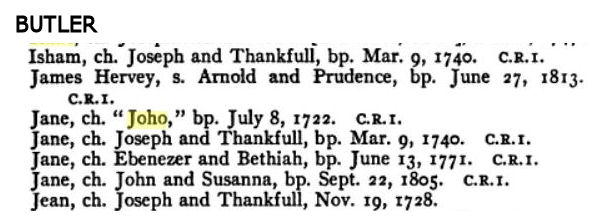
In one of my many searches of the Internet for information about the Joho/Yoho family, I found a reference to an Isaac Joho who served in the Massachuetts 7th Regiment, 10th Company of the Louisbourg Soldiers. What made this discovery even more interesting is the date in which Isaac Joho is listed as a member of this unit. The date, 1745, is only seven years after Johannes Joho and his wife Susanna settled in Conewago, Adams/York County PA in 1738. A search of Palatine German ship manifests shows no record of an Issac Joho or any Joho other than Johannes Joho and his family who arrived in 1738 aboard the "Two Sisters". It should be noted there are no federal records of Boston Massachuetts ship arrivals prior to 1883 as those records were destroyed in a fire. In addition, ships arriving in Canada prior to 1850 were not required to keep records of passengers.
Johannes was not known to have a brother by the name of Isaac and a search for close relatives of Johannes's father Johann Michael has not been successful. So who is Isaac Joho? Misspelling of names is not uncommon especially in early records. Johannes's last name Joho was misspelled Johe in one place on the ship manifest. It should be noted that early settlers sometimes joined military units not associated with where they lived. It is possible that Issac's last name was misspelled and could have been Joh, Johe, John or some other similar name. it is also possible that the surname Joho was used by a Massachuetts Indian or is a corruption of an Indian name from that state. New input (3/6/13) discussed at the end of this article may offer a more reasonable explanation of the use of the name Joho.
An initial search of families living in Massachuetts in the early 1700's showed no families with spelling JOHO. However, a recent document "Vital Records of Edgartown Massachuetts to Year 1850" revealed four children "ch" under the family name BUTLER with spelling JOHO. All four listed below have the same "bp" date, 1722. The meaning of "bp" was not given in the index. I contacted a genealogist in Edgartown who thought the abbreviation meant "Baptism". This makes sense as all four "Joho's" have the same "bp" date. "C.R.I." is an abbreviation for Church Record, Church of Christ. Even with the data at hand, It is not known if JOHO is a surname, a misspelling of a surname or an abbreviation. A list of abbreviations in the source does not list "Joho" therefore the use could be a surname. The question is how the possible surname is related to the BUTLER family and are they related to Isaac Joho or are these other Massachuetts Indians that were adopted? An inquery to the county clerk of Edgartown has not resulted in a response.

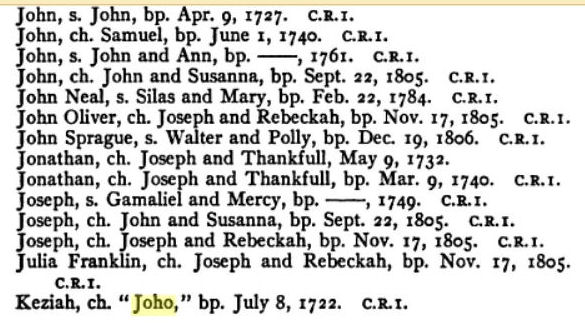

Evidence that Isaac Joho existed comes from several different sources listing his name with that spelling. It is still however possible that the original misspelling was transferred to other documents. Those documents lead to a discussion of what a Louisbourg Soldier was and what role they played in the pre-revolutionary war era.
The first reference I found below shows Isaac Joho in the 10th Company of the 7th Regiment of Louisbourg Soldiers. Note that he is a member of Capt. Lumbart's Company. His rank is not shown but he was no doubt an "enlisted" man. The searchbot highlighted Joho and Ebenezer of the next name. The reference was printed in 1871, but the list is dated 1745 (not shown in dcoument) That means these soldiers were under command of the British Crown.
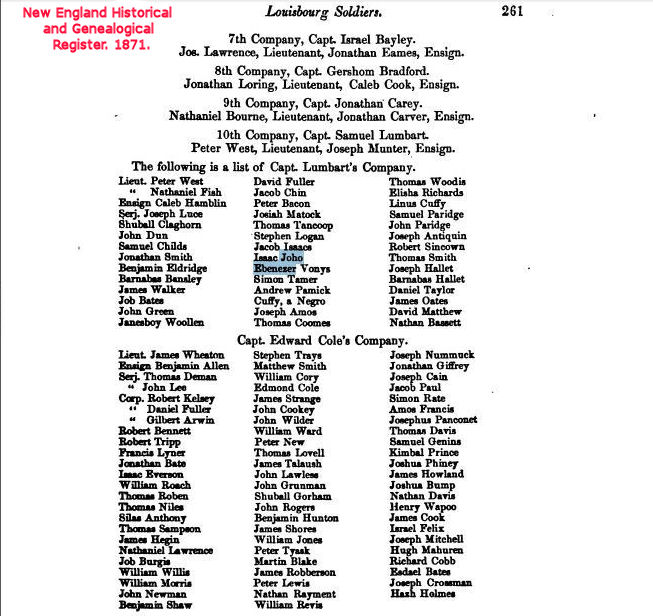
The second document is dated 1744 and lists Isaac Joho. It appears that Capt. Samuel "Lumbrt" (Lumbart) was on furlough.
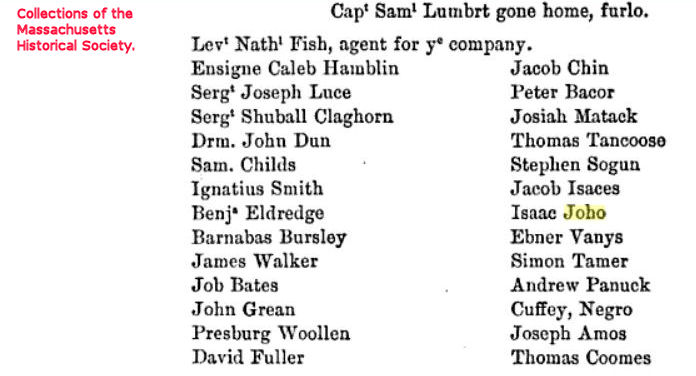
Isaac Joho's name was also found in another source in a publication entitled "The Men and Women in the Louisbourg Expedition of 1745 Led Against the Fortress of Louisbourg" by Eric Krause http://www.krausehouse.ca/krause/LsbgSiege_1745.htm
A search of "Surnames" in the database of this source showed Isaac Joho:
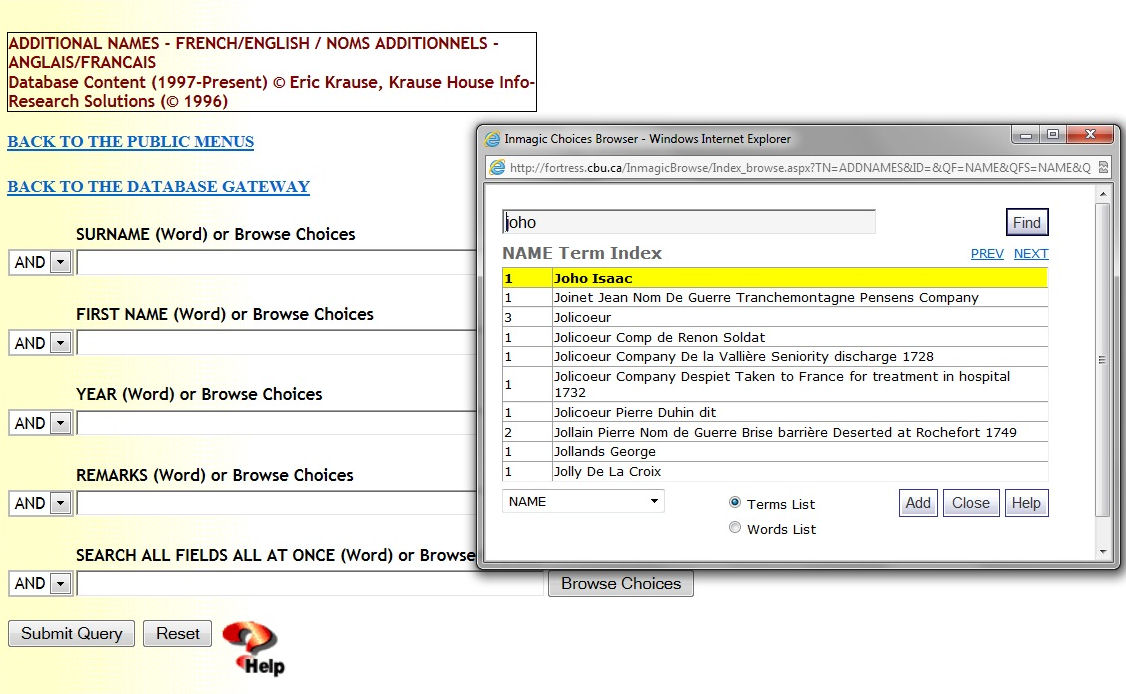
The Commander of Isaac Joho's Company, Captain Samuel Lumbart, is listed in another document in the 10th Company of the Seventh Massachusetts Regiment. Colonel Shubael Gorham is commanding. His son Lt Col. John Gorham is second in command. The Gorhams were prominately involved in the Battle of Louisbourg Nova Scotia in 1745. They and their men including Isaac Joho were referred to as Rangers and were British subjects under command of the crown of England.
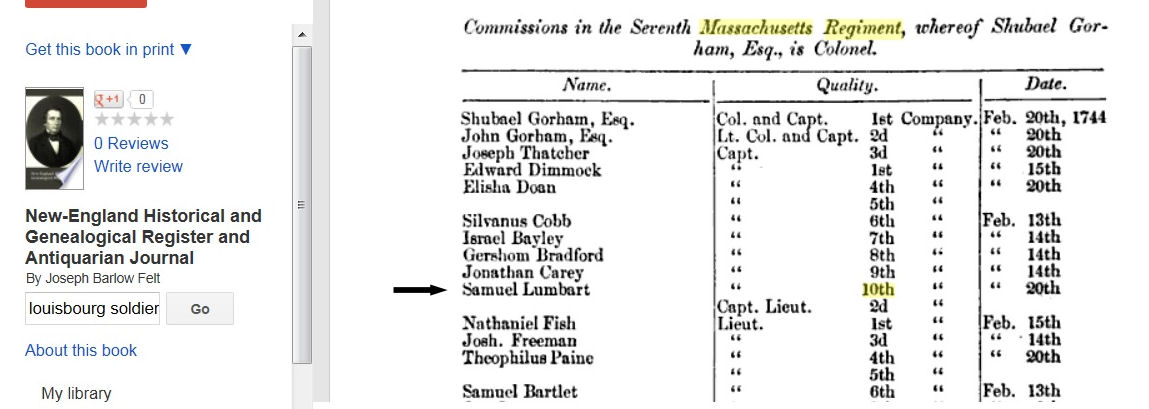
This brings us to the Battle of Louisbourg in which "New England attacked Canada in 1745 -- and won. The largest colonial militia ever assembled in the New World to that date, 4,000 men, lay siege to the great walled French city at Louisbourg until the fortress fell. Thousands of French citizens who occupied the strategic port on what is now Cape Breton Island were shipped home to France. Nearly 1,000 New Englanders -- men of Maine, New Hampshire, Massachusetts, Rhode Island and Connecticut -- died at Louisbourg, most from exposure and disease, and their bones can still be found in the nearby Nova Scotia fields." (Four Thousand Yankees Attack Canada)
A summary account of the prelude and battle can be read on Wikipedia. Some details of the battle are given below and come from the book, "Seeds of Discontent: The Deep Roots of the American Revolution, 1650-1750:
The elite troops of Colonel John Gorham's Rangers loaded into boats for the first wave of the assault. made up mostly of Mohawk Indians and men of mixed race, Gorham's initial special company of fifty men had proven itself during its defense of Annapolis royal in 1744 and the offensive attacks that followed. They were well disciplined and fierce, and thier ruthless tactics made them feared by the French. Gorham had been induced to raise additional men and join the Louisbourg campaign as a Lt. colonel in the Seventh Massachusetts Reginment, commanded by his father, Colonel Shubael Gorham and both Gorhams were part of General Pepperrell's select war council.
The younger Gorham was charged with organizing and landing of the troops in this critical amphibious assault, and he and his men would set the example for the raw New England recruits. As the force headed for the landing site in Flat Point Cove, the French defenders raced to take up defensive positions along that shore. The colonial warships Boston Packet, Massachusetts, and Lord Montague bombarded the terrain behind the landing beach. the vulnerable American troops neared the beach and the French defenders opened fire. The initial assault was joined by numerous other boats loaded with more troops that had been hidden behind the ships.
The progress was slow because the men moved in single file, fifteen paces apart so the cannon fire could not strike more than one man at a time. The Yankee sailors strained at the oars of other loaded whaleboats and pulled ahead of the French force struggling through the thick woods. There was high surf running in the bay as the American soldiers tumbled out of the boats into frigid, waist-deep water. Gorham's Rangers formed into ranks and prepared to advance on the enemy coming through the woods, as additional scouts fanned out to determine if a larger French force was waiting to spring a trap on the Americans.
The French commander, Morpain, seeing hundreds of additional Americans gaining the beaches then realized that theirs was a lost cause and the best course of action was to retreat to the fortress where they could fight another day.
The crisp discipline exhibited by Gorham's Rangers contrasted with the disorganization of the rest of the force of two thousand who landed on that first day......... More of the battle can be read in the source above.
I contacted the Canadian Park Service and asked if there were any records of the men who died in the battle. The response is below:
Dear Mr. Yoho,
Many New England soldiers died at Louisbourg in 1745-1746, far more of disease in the winter that followed the siege than in the siege itself. Unfortunately there is no list of those who died. There are some good sources for researching those troops that may help you.
The provincial forces raised by Pepperell for the expedition to Louisbourg in 1745 were irregular troops, not belonging to any standing force. The best records about this force are in the Pepperell Papers held by the Massachusetts Historical Society. They would also be your best source of information.
http://masshist.org/online/
George Rawlyk published an account of this expedition, Yankees at Louisbourg, with the University of Maine Press in 1967. This excellent account might help you to orient your search.
The Society of Colonial Wars has been very active commemorating these events, their collection at the Boston Public Library may also be of help to you. http://archon.bpl.org/?p=collections/controlcard&id=21
The siege of 1745 was a dramatic and important moment in our history that we are proud to share. There is a significant monument here to the troops from Massachusetts that died during the colonial wars. I wish you the best of luck in your research and hope that you have the opportunity to visit the Fortress of Louisbourg one day and to see the monument to your ancestor.
all the best,
Anne Marie Lane Jonah
Historian/Historienne
Parks Canada / Parcs Canada
Fortress of Louisbourg NHS/LHN de la Forteresse-de-Louisbourg
259 chemin Park Service Road
Louisbourg, N.S./ N-É B1C 2L2
(902)733-3535
Government of Canada | Gouvernement du Canada
Louisbourg300 – Come celebrate! | Le 300e de Louisbourg – Soyez de la fête!
Unfortunately, a search of the sources given above did not reveal any additional information about Isaac Joho.
The book "Seeds of Discontent" by J. Revell Carr does cover great detail of the battle and how the Colonial Troops were enlisted. The promise of a share of the spoils of the battle did not happen as the Colonial force leaders decided to let the French leave with all their possessions. It was also pointed out that part of the defending garrison of troops were Swiss. It remains to be determined if there was any connection to Isaac Joho being a member of the Colonial forces.
It is interesting to note that Colonel Shubael Gorham spent all his money and many years of his life founding the town of Gorham Maine. His son John Gorham followed the merchant and shipping trade in his later years. He contracted smallpox in England and died at the age of only 43.
General William Pepperrell eventually was appointed royal governor of Massachusetts. When, a few years later, the British again battled France and retook Louisbourg and razed it to the ground, he was appointed Lieutenant General, but died in 1759 and was buried in Kittery.
Assuming there was an Issac "Joho", his origin or presence in the U.S. is a mystery with a possible Indian explanation. If Issac was Swiss he could have come into the US at Boston or via Canada, but those records do not exist. If Isaac Joho did exist, it is possible he died in the Battle of Louisbourg which might explain why his records were found only in the military archives. The Joho's listed in the vital records of Edgartown Massachusetts are also a mystery, but again with a possible Indian explanation. If these are Joho's, are they related to Isaac Joho or are these Joho's from a Massachuetts Indian family? The last possibility came to light in several emails (3/8/13) from Dr. Brian Carroll, Assistant Professor of History at Central Washington University.
Dear Tim, Saw your page "The Mystery of Isaac Joho as a Massachusetts Louisbourg Soldier"--FYI. The company he was in was raised on Cape Cod and Martha's Vineyard-which at the time had a very large Native American population. A large number of men in Gorham's regiment were Native Americans. In Lambert's company alone probably one in four is a Wampanoag (Chin, Matock, Taneop, Isaacs, Pamick, Amos, Coomes, Antiquin, Sineown, and in my opinion possibly Joho and Vonys). Overall about 4 in 10 privates in the regiment was an Indian. Many of them also worked in the region's extensive whaling industry at the time. The regiment was known as "The Whaleboat Regiment" because it contained so many white and Indian whalemen--and they conducted amphibious operations using whaleboats. And in the Martha's Vineyard vital records many Indians are mixed throughout the listings but not identified as Indians. Many were converted Christians with names that mixed English and Native names--such as Thomas Tancoose and Joisah Matack who are listed just 3 or 4 names above Joho on the list. Other Wampanoag in the region at this point had completely English names by this point such as Joseph Amos or James Richards. So look into that possibility. I'd hunt around and try to find some reservation lists (hard to find but they do exist) from M.V. and the Cape and see if Joho winds up on any of those lists.
I suspect this one (Joho) is in fact a Wampanoag Indian and not one of your Swiss relatives as white record keepers usually horribly misspelled Indian names. And there are some Indian surnames on the Vineyard that are close to Joho or Yoho, such as Jo, Job, Jobe, Joel, Jolle, Judah, and Woso/Yoso, etc.--record keepers were usually only using short forms of there names--In truth many went by names like Joseph Wasomunnuck but the scribe records them a "Joe Waso" or something like that.
The greatest concentration of Indians in Mass. in the late eighteenth and 19th century and down to now is the SE corner of the state--Cape Cod, Martha's Vineyard, and Nantucket. There are still Wampanoag reservations on the Cape and M.V. today--at Mashpee and Aquinnah. In the 1740s there were 6 reservations on Cape Cod alone, at least 3 on MV and one on Nantucket. And the Natives were very integrated into the economy at the time--working as sailors, whalers, in construction, as farm hands, etc., so they show up in a lot of "English" or American records--which is what I think happened in this case.I am writing a book on Indian soldiers in the colonial military so I periodically search for info about Indians in the 7th Mass (and other key units I know contained Natives). That's how I came across your page.
Brian Carroll, PhD
I am inclined to support the hypothesis of Dr. Carroll that Isaac Joho was in fact an American Indian and not a Swiss family relative. The lack of evidence for the arrival of an Isaac Joho to the U.S. also supports his idea. If anyone has any thoughts or further information on this find, please contact me.
Tim Yoho 2/9/2013 Revised 3/9/13